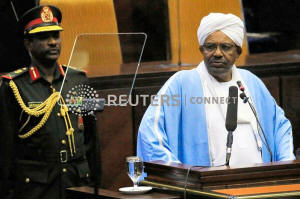|
Sudan's Bashir forced to step down,
sources say
 Send a link to a friend
Send a link to a friend
 [April 11, 2019]
By Khalid Abdelaziz [April 11, 2019]
By Khalid Abdelaziz
KHARTOUM (Reuters) - Sudanese President
Omar al-Bashir was forced to step down by the military on Thursday after
three decades of autocratic power, and moves were under way to form a
transitional council to run the country, Sudanese sources said.
Government sources and the minister of production and economic resources
in North Darfur, Adel Mahjoub Hussein, told Dubai-based al-Hadath TV
that Bashir's presidency was over and consultations were being held on
creating a ruling military council.
Sudanese sources told Reuters that Bashir, 75, was at the presidential
residence under "heavy guard". A son of Sadiq al-Mahdi, the head of the
country's main opposition Umma Party, told al-Hadath TV that Bashir was
under house arrest along with "a number of leaders of the terrorist
Muslim Brotherhood group".
Early on Thursday morning, state television said the military would make
an announcement soon. But hours later no statement had been issued, amid
reports of differences about the make-up of the transitional council.

Some demonstrators, who have rallied against Bashir since Dec. 19, said
they feared the delay would allow him to go into exile.
State television and radio played patriotic music, a reminder of how
military takeovers unfolded during previous episodes of civil unrest.
Troops deployed around the defense ministry and on major roads and
bridges in the capital.
Thousands of people flocked to an anti-government protest outside the
ministry, while huge crowds took to the streets in central Khartoum,
dancing and shouting anti-Bashir slogans. Protesters chanted: "It has
fallen, we won."
Demonstrators called for a civilian government and said they would not
accept an administration led by military and security figures or
Bashir's aides.
Omar Saleh Sennar, a senior member of the Sudanese Professionals'
Association, one of the main protest groups, said it was waiting for the
army statement and expected to negotiate with the military over a
transfer of power from Bashir.
"We will only accept a transitional civilian government," Sennar told
Reuters.
Kamal Omar, 38, another demonstrator, said: "We will continue our sit-in
until we prevail."
[to top of second column]

|

Sudanese President Omar al-Bashir delivers a speech inside
Parliament in Khartoum, Sudan April 1, 2019. REUTERS/Mohamed
Nureldin Abdallah/File Photo

Soldiers stormed the headquarters of Bashir's Islamic Movement, the
main component of the ruling National Congress Party, a Reuters
witness said.
FATE UNCLEAR
It was not known what would now happen to Bashir.
He has been indicted by the International Criminal Court in The
Hague and is facing an arrest warrant over allegations of genocide
in Sudanís Darfur region during an insurgency that began in 2003 and
led to death of an estimated 300,000 people.
Bashir, a former paratrooper who seized power in a bloodless coup in
1989, has been a divisive figure who has managed his way through one
internal crisis after another while withstanding attempts by the
West to weaken him.
Sudan has suffered prolonged periods of isolation since 1993, when
the United States added Bashirís government to its list of terrorism
sponsors for harboring Islamist militants. Washington followed up
with sanctions four years later.
The latest crisis has escalated since the weekend, when thousands of
demonstrators began camping out outside the defense ministry
compound, where Bashir's residence is located.

Clashes erupted on Tuesday between soldiers trying to protect the
protesters and intelligence and security personnel trying to
disperse them. At least 11 people died, including six members of the
armed forces, the information minister said, citing a police report.
Since December, Sudan has been rocked by persistent protests sparked
by the government's attempt to raise the price of bread, and an
economic crisis that has led to fuel and cash shortages
(Reporting by Khalid Abdelaziz and Mohamed El Sherif, writing by
Sami Aboudi; Editing by Simon Cameron-Moore, Samia Nakhoul and Giles
Elgood)
[© 2019 Thomson Reuters. All rights
reserved.]
Copyright 2019 Reuters. All rights reserved. This material may not be published,
broadcast, rewritten or redistributed.
Thompson Reuters is solely responsible for this content. |